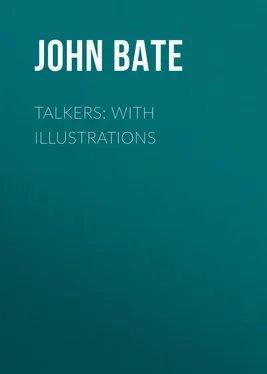John Bate - Talkers - With Illustrations
Здесь есть возможность читать онлайн «John Bate - Talkers - With Illustrations» — ознакомительный отрывок электронной книги совершенно бесплатно, а после прочтения отрывка купить полную версию. В некоторых случаях можно слушать аудио, скачать через торрент в формате fb2 и присутствует краткое содержание. Жанр: foreign_antique, foreign_prose, на английском языке. Описание произведения, (предисловие) а так же отзывы посетителей доступны на портале библиотеки ЛибКат.
- Название:Talkers: With Illustrations
- Автор:
- Жанр:
- Год:неизвестен
- ISBN:нет данных
- Рейтинг книги:5 / 5. Голосов: 1
-
Избранное:Добавить в избранное
- Отзывы:
-
Ваша оценка:
- 100
- 1
- 2
- 3
- 4
- 5
Talkers: With Illustrations: краткое содержание, описание и аннотация
Предлагаем к чтению аннотацию, описание, краткое содержание или предисловие (зависит от того, что написал сам автор книги «Talkers: With Illustrations»). Если вы не нашли необходимую информацию о книге — напишите в комментариях, мы постараемся отыскать её.
Talkers: With Illustrations — читать онлайн ознакомительный отрывок
Ниже представлен текст книги, разбитый по страницам. Система сохранения места последней прочитанной страницы, позволяет с удобством читать онлайн бесплатно книгу «Talkers: With Illustrations», без необходимости каждый раз заново искать на чём Вы остановились. Поставьте закладку, и сможете в любой момент перейти на страницу, на которой закончили чтение.
Интервал:
Закладка:
November , 1877.
I.
THE MONOPOLIST
“Gratiano speaks an infinite deal of nothing: more than any man in Venice; his reasons are as two grains of wheat hid in two bushels of chaff; you shall seek all day ere you find them; and when you have them, they are not worth the search.”
– Shakespeare.The Monopolist enters into conversation with plenitude of speech enough to make one think he has obtained a royal patent to do so. He talks without much regard to what he says, or how he says it. Give him your attention in the least degree, and he will show no lack of will or power to surfeit you. It is not because he has anything to say worth your hearing that he keeps up his talk, but only from his strange love of talking. His conversation consists mainly in the exercise of his tongue, as the faculties of his mind are generally dormant in proportion as that works. He talks so much that you need do nothing but listen. He seldom asks questions, and if he does, he cannot tarry for answers. While one is speaking he either breaks in upon his discourse, heedless of what he is saying; or he employs himself in gathering words to commence talking again. And scarcely has the speaker finished his utterance ere he begins and goes on at a rate that taxes both the ears and patience of his listener. At the festive board he is not content to do one thing at a time. He fills his mouth with food for his stomach, and with windy words for the company; which two acts done at the same time prevent necessary mastication, and produce a temporary collision of the contrary elements in his guttural organs.
Monopolist is a talker with whom I am somewhat acquainted. I have on different occasions met with him, and am, therefore, prepared to speak of him as I have found him.
Some fifteen or sixteen years ago, as my memory serves, in the middle of a severe winter, I met this gentleman as I was going to see a friend about some business of pressing importance. I told him my business required haste, and he must excuse me stopping just then. But taking me by the hand, he held on until he was fairly on the track of talking. What he talked about I cannot remember, though I am pretty sure there was very little connection or sense in what he said. He spoke in such a rapid manner that all I could say was “Yes,” “No,” “Ah,” “Eh,” “Indeed,” “Is it possible?” and some of these, too, only half uttered because of the rapid flow of his words in my ears. I did try once to make a remark in response to a question he hurriedly asked; but I had scarcely spoken three syllables (being slow of speech as I am) when he began at an express rate to tell a story of a friend of his, in which I felt no more interest than the man in the moon. I remember how I shivered with cold; shuffled to keep myself warm, and made frequent attempts to leave him, while with one hand he held the button of my coat, and with the other wiped the perspiration from his brow. I finally took advantage of a suspense while replacing his handkerchief; so abruptly wishing him “good-bye,” I went on my way, leaving him to resume his discourse to himself. How long he stood talking after I left him he never told me.
One morning, not long ago, when in a studious mood upon a subject I was anxious to complete, my wife informed me a certain gentleman had called to see me. On entering the room, I saw, to my inner sorrow, the very identical person who, above all others, I cared the least to see at that time. Had he possessed a grain of ordinary discernment, which the Monopolist does not, he would have seen from my manner I was little inclined to give him even a courteous reception, not to say a long interview. In fact I gave him several broad hints I was very busy, and could ill spare much time in his company. But what did he care for hints? He had commenced his talking journey, and must go through with it; so away he went in his usual style, talking about everything in general and nothing in particular, until he had out-talked the morning hours, and allayed my mental afflatus by the vocal effusions of his inane, twaddling loquacity. He then took a lingering departure, bid me “good-bye, hoping that he had not intruded upon my duties of the morning.” Alas!
About a year or so after the incident referred to above, I invited a few select friends to spend an evening at my house. Among the number were the Rev. Mr. Peabody and Mrs. Peabody, Professor Jones, of Merton College, and Mrs. Jones, Mr. and Mrs. Hungerford, Mr. and Mrs. Thuckton, with others. I was very pleased with the character of my company, and anticipated considerable pleasure during the evening. Mr. Peabody, Professor Jones, and Mr. Hungerford were gentlemen of more than ordinary attainments, and capable of communicating much varied and interesting intelligence in conversation.
The early part of the evening passed in a manner apparently agreeable to all present. But, alas, the happiness was destined to be short-lived! for who should be ushered into the room by the servant but an unexpected caller? I knew him well at first sight. He stepped into the room with his usual display of self-assurance and self-gratulation. After the ceremony of introduction to those who did not know him, he took his seat in the most conspicuous part of the company.
I thought to myself, “The pleasure of the evening is now at an end, excepting what he will have in hearing himself talk.” I could see in the very expression of his face that he was full-primed, and ready for a long discharge. There was a short pause after he had taken his seat (as there generally is in all company after the introduction of a stranger); but not being accustomed to this sort of thing, he began with a rapid utterance of some common-place observations, which elicited no response, excepting a gentle bend of the head from Mr. Thuckton, to whom he seemed more particularly to direct his attention. This was enough to assure him what he had said met with approval. He now commenced in good earnest, and went on so fast and so long, one wondered how the effort was sustained by the ordinary vocal powers and breathing functions of a mere mortal.
Every now and then the thought seemed to cross his mind, “Now I have something to say of great importance.” At which time he threw his head back, winked with his left eye, cast a significant glance at Mr. Hungerford, and said, “Mark, sir, what I am going to say:” then, bending forward, placed his hands on his knees, and lo the “mountain in labour brought forth a mouse.”
He had a most singular way of snapping with his thumb and finger, according to the nature of his talk; and when he reached a climax in an argument, or made a statement with emphasis, he brought down his hands with such violence on his knees as to make one fear the consequences. The gentlemen smiled at the snapping and thumping. The ladies were annoyed at his want of decorum and good breeding, and my son, a boy six years old, asked in his innocence, “Who in the room is letting off pop-guns?”
At this juncture he gave himself a respite, thinking, perhaps, common decency called for it, so that some one else might have a chance of speaking as well as himself. But the fact was he had talked all the talk out of the company, and no one cared to enter on the arena of conversation to be instantly pushed off by his egregious monopoly. He was, however, determined there should be talk, even if he did it all himself. He asked Mr. Thuckton a question, but before he had time to give an answer, Monopolist was half-way through his own views on the subject. He then appealed to Mr. Hungerford as to the correctness of a certain sentiment he had expressed a moment before, and while Mr. Hungerford was cautiously replying, he set off in a circuitous route to show he was unquestionably right in what he had affirmed. He proposed a question to Professor Jones upon a scientific difficulty. The Professor began calmly to answer, and all the time he was speaking, I observed Monopolist fidgety to go on, and ere he had finished he broke out of his restraint and found relief in hearing himself say his own thoughts on the subject.
Читать дальшеИнтервал:
Закладка:
Похожие книги на «Talkers: With Illustrations»
Представляем Вашему вниманию похожие книги на «Talkers: With Illustrations» списком для выбора. Мы отобрали схожую по названию и смыслу литературу в надежде предоставить читателям больше вариантов отыскать новые, интересные, ещё непрочитанные произведения.
Обсуждение, отзывы о книге «Talkers: With Illustrations» и просто собственные мнения читателей. Оставьте ваши комментарии, напишите, что Вы думаете о произведении, его смысле или главных героях. Укажите что конкретно понравилось, а что нет, и почему Вы так считаете.












